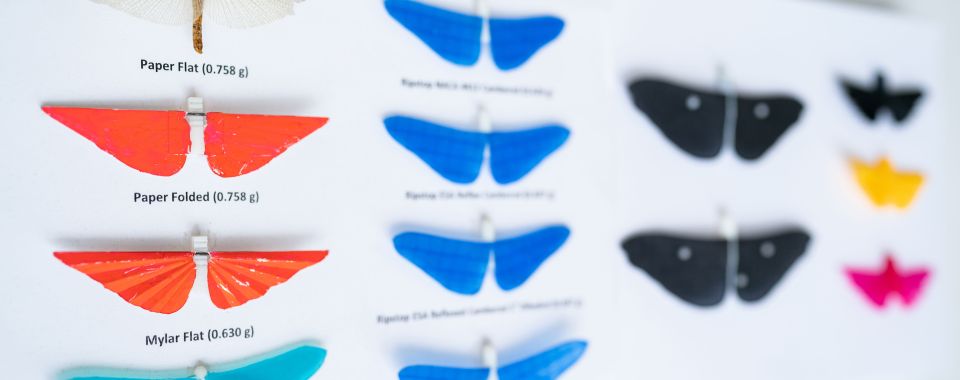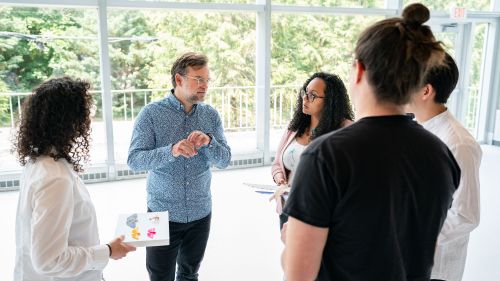
A team led by Pierre-Thomas Brun and Aimy Wissa is studying the structures and capabilities of grasshopper wings and flying fish fins. An innovation grant will allow the researchers to test different types of foldable wings and model their performance. Photos by Tori Repp/Fotobuddy
Molly Sharlach, School of Engineering and Applied Science
June 26, 2023
Princeton Engineering researchers are starting new projects to boost biofuel production by studying microbes from extreme environments, abate urban heat islands through machine learning, and develop new kinds of deployable wings for robots — all funded by the latest round of innovation grants from the school.
The engineering school awarded more than $2.4 million in 2023 annual research grants for these and 14 other projects. Pierre-Thomas Brun, assistant professor of chemical and biological engineering, and Aimy Wissa, assistant professor of mechanical and aerospace engineering, are collaborating on the project to investigate new wing designs for gliding robots. Combining their expertise in the mechanics of soft materials and in bio-inspired flight, Brun and Wissa’s research groups are studying the structures and capabilities of grasshopper wings and flying fish fins.

Both these appendages can be deployed in milliseconds when an animal switches from jumping or swimming to gliding flight — in contrast to the fixed wings of typical gliding robots. The interdisciplinary team plans to take advantage of soft structures’ pliability to help robots make quick maneuvers.
The innovation grant will allow the team to test different types of foldable wings and model their performance. After designing a wing that can be rapidly deployed, they will also investigate how raylike structures, similar to those in the fins of flying fish, can be manipulated to increase lift or achieve turns during gliding flight. Future work may also explore systems for actively powered flight and other modes of locomotion.
“We’re hoping to develop a framework that helps us think about designing articulated soft structures for robotics in general,” said Wissa. Beyond flying robots, any types of robots intended for human interaction could benefit from new types of soft structures, she said.
Soft robots are far safer and nimbler than the rigid structures that dominate current systems, but soft structures are difficult to control. This work will advance the ability to control soft robots, which is crucial for designing robots at small scales, said Brun.
Their collaboration is supported by the Addy Fund for Excellence in Engineering.
Princeton Engineering’s Innovation Research Grants are funded by Princeton alumni, parents and other donors. This year’s awards to MAE faculty include:
Addy Fund for Excellence in Engineering
The Addy Fund for Excellence in Engineering was established in 2017 by Lydia B. Addy and William M. Addy, a 1982 Princeton alumnus.
In addition to Pierre-Thomas Brun and Aimy Wissa, two Addy Fund grants were awarded to MAE faculty:
Michael Mueller, professor of mechanical and aerospace engineering, for the project “Machine learning-accelerated engineering simulations with extremely complex models”
and Anirudha Majumdar, assistant professor of mechanical and aerospace engineering, and Karthik Narasimhan, assistant professor of computer science, for the project “Dynamic knowledge retrieval for adaptive planning in robots.”
Project X Fund
Project X funding enables Princeton engineering faculty members to pursue exploratory research geared toward “creativity, tinkering and risk-taking.” The fund is made possible by G. Lynn Shostack in honor of her late husband David Gardner, a 1969 Princeton graduate.
One of the Project X grants was awarded to Christine Allen-Blanchette, assistant professor of mechanical and aerospace engineering and statistics and machine learning, for the project “Discovering the structure of mechanical systems from video.”
Read about all of this year's Innovation Awards on the School of Engineering and Applied Science website.